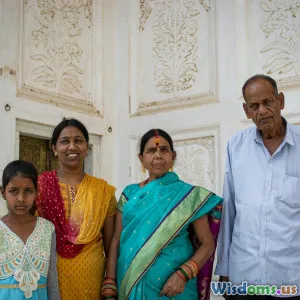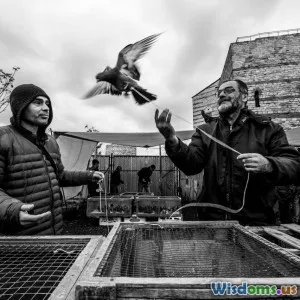
How Grandparents Shape Family Traditions More Than You Think
7 min read Explore how grandparents profoundly influence family traditions, enriching relationships and heritage across generations. (0 Reviews)
How Grandparents Shape Family Traditions More Than You Think
Family traditions are the heartbeats that synchronize generations. While parents often get the spotlight for maintaining customs, grandparents wield an extraordinary influence that is sometimes underestimated. This article unveils how grandparents, with their unique experiences and nurturing presence, shape family traditions profoundly and enduringly.
Introduction
Have you ever wondered why some family traditions feel timeless, resonating deeply even as the world changes around us? The answer often lies with your grandparents, the custodians of heritage, values, and memories. Their stories, habits, and teachings create the cultural glue that holds families together. Beyond just babysitting or gift-giving, grandparents infuse traditions with meaning, helping families sustain and evolve their unique identities.
The Role of Grandparents in Preserving and Transmitting Culture
Guardians of Heritage
Grandparents are often the last living links to past generations, carrying firsthand memories of cultural customs, language, and history. For example, in many immigrant families, grandparents teach grandchildren their native languages or cook traditional meals, keeping cultural roots alive despite assimilation pressures.
Anthropologist David M. Schneider highlighted that kinship isn’t just biological—it’s symbolic. Grandparents embody this by transmitting stories and symbolic practices that define family identity.
Custodians of Rituals and Celebrations
From holiday gatherings to birthdays and rites of passage, grandparents frequently anchor crucial rituals. Their participation lends weight and continuity to these occasions. Take the example of the Italian tradition 'La Befana' celebrated particularly by grandparents, where they narrate folklore, creating magical experiences for grandchildren yearly.
In a 2016 Pew Research study, 62% of adults said they learned holiday traditions largely from older family members, mainly grandparents. This statistic confirms their central role in tradition preserving.
Emotional Impact on Intergenerational Bonds
Building a Legacy of Love and Stability
Grandparents often offer unconditional love and a stable presence, especially in times of family stress. This emotional security allows family traditions to flourish, fostering trust and a sense of belonging. Psychologist Dr. Mignon Moore notes that grandparents “provide an essential emotional infrastructure for children” that supports identity formation and resilience.
Mentorship and Storytelling
Stories from grandparents do more than entertain – they convey morals, family values, and lessons drawn from lived experience. These narratives help grandchildren see themselves as part of a larger continuum. For instance, many African American families highlight how elders use storytelling to preserve histories that otherwise would be lost due to historical disenfranchisement.
Grandparents as Innovators of New Traditions
While much emphasis is placed on preservation, grandparents also innovate. Many adapt or create new customs that reflect changing family dynamics or societal shifts.
Examples of Adaptation:
- Blending Cultures: In multiethnic families, grandparents often blend traditions creatively, such as combining foods during holidays or scheduling celebrations that respect multiple cultural heritages.
- Modern Celebrations: Grandparents sometimes introduce new holiday traditions, like movie nights or nature hikes, which merge old values with contemporary experiences.
These innovations illustrate how grandparents are active participants in keeping family dynamics fresh and inclusive.
Case Studies: Grandparents in Action
The Scandinavian 'Fika' Influence
In Scandinavian culture, "Fika"—a coffee break accompanied by cake—is a cherished daily tradition often preserved and taught by grandparents. This ritual cultivates family conversation and bonding, showcasing how a simple practice maintains heritage while fostering emotional ties.
Japanese Obon Festival
In many Japanese families, grandparents play a leading role in Obon, a festival honoring ancestors. Leading ceremonies and involving grandchildren in dances and storytelling ensures these traditions remain vibrant across ages.
Storytelling Among Indigenous Peoples
In Indigenous communities worldwide, elders, typically grandparents, are revered knowledge bearers. Their storytelling sessions transmit language, belief systems, and ecological wisdom, directly shaping family roles and cultural continuity.
Practical Ways to Encourage Grandparent-Inspired Traditions
- Active Engagement: Invite grandparents to share recipes, stories, or craft activities with younger family members.
- Record Stories: Use audio or video to capture grandparents’ stories, making them accessible and preserving narratives for future generations.
- Celebrate Ancestry: Host cultural heritage days where grandparents lead or participate actively.
- Involve in Planning: Engage grandparents in organizing family celebrations or milestones.
By doing so, families reinforce intergenerational respect and stewardship of traditions.
Conclusion
Grandparents are more than family elders—they are architects of tradition, steadfast guardians of cultural legacy, and powerful emotional anchors in the tapestry of family life. Their contributions transcend mere participation; they create meaningful rituals and narratives that bond generations. Understanding and honoring the depth of their influence offers families a richer, more connected experience.
The next time you partake in a family tradition, remember the story behind it—and the grandparents who shaped it. Embrace their wisdom and energy to ensure these cherished practices thrive for generations to come.
"Grandparents make the world a little softer, a little kinder, and a little warmer." — Anonymous
References:
- Pew Research Center (2016). Generations and Family Life
- Schneider, D. M. (1984). A Critique of the Study of Kinship
- Moore, Mignon (2011). The Role of Grandparents in Family Well-being
- Examples from cultural practices: Scandinavian Fika, Japanese Obon Festival
Rate the Post
User Reviews
Popular Posts





















